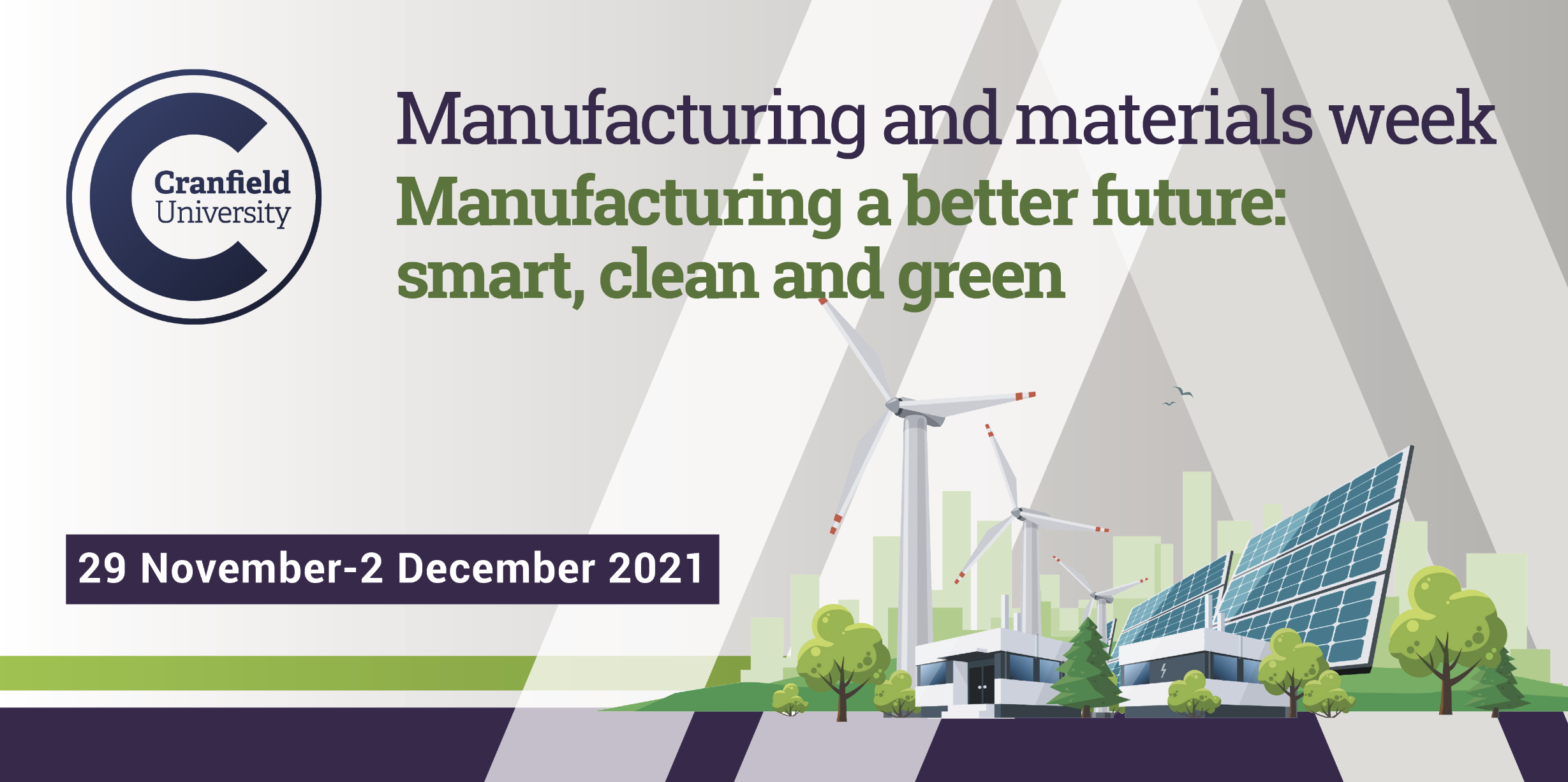Building strength and breaking down barriers
17/11/2021

Professor Mark Jolly, Director of Manufacturing, and Hiran Odedra, Cranfield’s Head of ED&I discuss the importance of diversity in creating the strongest team.
Over the last few years the importance of Equality, Diversity and Inclusion (ED&I) has gathered momentum across all areas of society. While every company has an ED&I policy today, it is not enough to simply have the words written down. It is wholly about what organisations are doing to embed ED&I at all levels and evidence of the policy working in practice.
Hiran Odedra, as Cranfield’s Head of ED&I, is responsible for developing and implementing strategies to create a more diverse and inclusive environment at the University. She explains “In just a few years the importance of ED&I has changed dramatically. Today, more of our academics are reaching out to understand the actions they can take to embed ED&I into research projects to make them more inclusive. ED&I is not simply about legal compliance or ticking boxes. To ensure the success of a project, we need to make decisions collaboratively and to do this we need different perspectives. ED&I covers everything beyond those characteristics protected by law (such as disability, gender, race and sexual identity and orientation) from neuro-diversity to social inclusion.
Mark Jolly agrees: “The image many people conjure up when thinking about manufacturing is still men of a certain age and race. Historically the sector has appointed people who look and think like them. Yet by doing this they have been cutting out more than 50% of the potential workforce. The truth is that diversity has huge potential to improve manufacturing. An industry with a dreadful reputation for productivity would do well to invest in its people, creating a fully diverse workforce to get different ways of thinking about the challenges faced – from climate change to the technology revolution, and increasing productivity itself.”
“Yet it is a chicken and egg scenario. We need the role models to inspire, but also need to attract new people to manufacturing and materials industries from a young age. This requires commitment from recruiters to take bold moves and not recruit in their own image. And in terms of gender at least, this does seem to be a real issue for the UK. Looking across the world, especially in Europe, there is a more even balance of the sexes. In the UK we are at pains to show how we have moved on from women being encouraged into nursing or secretarial roles, versus men into engineering, law or medicine. However, manufacturing still feels very conservative and there is a definite gender bias – and this, along with other diversity, must be faced head on. Recognising this is the first step.”
Why are we in this position?
With a teenage son (and young daughter), Hiran has first-hand knowledge of the role schools have to play in ED&I. “If you look at the careers information today, it is still stuck in the 1990s. Sure, careers for women now stretch from IT and marketing, to law and medicine. However there no mention of all the opportunities in technology, engineering, space, or motor racing . Careers education in schools needs an overhaul, taking great examples from industry and manufacturing, sharing the potential, and providing role models for young people.”
Earlier this year, it was announced that Cranfield would lead the Government’s new £4.7m research consortium, Transforming Foundation Industries Research and Innovation Hub (TransFIRe), examining how the foundation industries can develop whilst helping achieve the net zero 2050 environmental targets. TransFIRe was developed in response to the Industrial Strategy Challenge Fund (ISCF) call to transform the foundation industries, and includes a consortium of 20 researchers from 12 institutions, more than 60 companies and 14 non-governmental organisations such as the sector trade associations, regional clusters NEPIC and Industry Wales, and professional engineering institutes such as the Institute of Materials Minerals and Mining (IOM3). By developing a self-sustaining hub of expertise to support the foundation industries’ transformation into non-polluting, resource-efficient, modern, competitive businesses, the aim is to work in harmony with the communities in which they are situated, providing attractive places to be employed with unparalleled equality, diversity and inclusion performance.
One of the TransFIRe industry partners is container glass company, Encirc360. They launched a campaign, aptly named Women with Bottle, to encourage more women into the industry. Mark explains: “When you think of manufacturing, the immediate image is of a dirty, smokey industrial plant – rather like Dante’s Inferno or Blake’s ‘satanic mills’. Yet modern plants could not be further away from this. Modern manufacturing, with automation, robotics and digital twins is about data, strategy and thinking – not picking up lumps of metal or glass with your bare hands.” Yet as Hiran explains, “We can’t make the assumption that girls don’t want to get messy. The hair and make up concerns are a cliche. In years gone by, people automatically thought of pilots and surgeons, electricians and firefighters as male roles, which perpetuated stereotypes. The younger generations are much more used to the new language we are encouraging to break down these stereotypes e.g., firefighter as opposed to fireman, police officer and so on.
Language and taxonomy play such an important part in ED&I and this is something Cranfield works hard at, and with great results. Cranfield uses software in recruitment advertising to ensure that the wording in adverts are at the very least, gender neutral, but more often, gender positive. Words such as ambitious and competitive have been shown to actively exclude women and ethnic minorities. Add the words ‘collaborative’ or ‘sustainable’ and we see a considerably more diverse group of applicants.
Tackling the uncomfortable truths
While bringing more women into manufacturing is taking time, it is slowly becoming a great reality. However, tackling the issues of race and ethnicity in the industry is difficult and a more uncomfortable truth to deal with. Disability presents similar challenges. While Cranfield has certainly made a start, having formed a disability network and working group, revised its disability policy and becoming Disability Confident Level 2 employers, there is still work to be done to make the campus accessible. A person’s sexual orientation is also an area where we need to use language that encourages people to feel comfortable talking about themselves. Hiran explains: “We know that if you cannot be your authentic self at work it is a danger to your mental health and wellbeing.”
Cranfield’s new hybrid working pilot seeks to provide improved work-life balance for staff. With the last two years creating an increased acceptance of flexible working, there is proof that this is creating a more positive, engaged, enthusiastic workforce. Hiran shares: “The impact on wellbeing is huge. But it also has a positive impact on productivity – and sustainability as well.”
Looking to the future
The main point about building strong team is that if you don’t have access to the whole population to create the team then you are at a disadvantage from the start. We know that the biggest challenge facing the manufacturing and materials sector is net zero. Mark questions: “How do we get manufacturers and companies to recognise how to achieve net zero, against the backdrop of all the constraints and challenges that achieving net zero ways will bring? For this we need strong and diverse teams – those who think in a different way to the people who created the problems in first place.”
Hiran believes it is also about making the industry more relatable. What do materials mean for young people entering the profession? What difference do they want to make? What are they truly passionate about? As generations move on, people are becoming more progressive. Our younger generations are born into a new culture, acutely aware of diversity and inclusion from an early age.
Hiran recognises that dealing with binary gender issues is relatively straightforward. There are great examples out there of women who go into manufacturing doing incredibly well, their tenacity encouraging an upward trajectory through a business. However different challenges are presented for other groups in terms of progression. In a foundry, you will find many ethnic minorities on the factory floor, however their challenge is progressing beyond this, into middle or senior management, with limited role models to aspire to. Mark hopes that the Cranfield Manufacturing and Materials strategy, encapsulated by the words “Smart, Clean and Green”, will be attractive across all cultures and under-represented groups.
Mark concludes: “We need to create an open culture and remove barriers. It doesn’t help that as a society we don’t see all diversity as the same. The media plays its part in perpetuating stereotypes. Here at Cranfield we know that our senior management team is not inclusive enough in its make up, however we are starting to move the dial in terms of thought processes and action. As an industry, manufacturing must do the same – we must not fear change or disruption. Instead we have to be open to new ways of doing things. And we need to call ourselves out when we get it wrong.”
Join Professor Mark Jolly and a stellar panel of speakers on Day 2 of Manufacturing and Materials Week. The panel consists of Professor Karen Holford CBE, Chief Executive and Vice-Chancellor, Professor Sue Black OBE, Durham University, and Dr Ayotunde Coker, CEO, Rack Centre Limited and winner of the Cranfield 2020 Distinguished Manufacturing Alumnus of the Year Award, Dr Cynthia Adu Senior Sustainability Consultant at Avieco, Cranfield Alumna and winner of the 2021 Worshipful Company of Founders Prize, and Halil Bedevi, Cranfield Alumnus and UK Head of Aerospace, Defence, Rail & Advanced Manufacturing at Santander Corporate & Commercial. They will consider how to build the strongest team through embracing diversity, with a call for the industry to focus on changing of the manufacturing environment and culture for the future.
Register to attend here: https://web-eur.cvent.com/event/cdfcfe03-6ee8-4f40-8cfa-e2fedd31ddb5/regProcessStep1?locale=en-US&tm=ILMJqi-0P63UJhEswWbZ7qMvXD8-DEEpF1IEB2tuBp4
Categories & Tags:
Leave a comment on this post:
You might also like…
From Sri Lanka to Cranfield: How a Commonwealth Scholarship transformed my environmental engineering journey
Hi, I’m Kavithanjali Uthayashangar and I’m here to tell you about my journey into environmental engineering. It began with a simple but powerful motivation: a desire to understand how engineering can ...
Inside the Air Transport Management MSc: Classes, assignments, and group project work
What’s it really like to study Air Transport Management at Cranfield? Adit walks us through a typical day, assignment expectations, and the excitement of hands-on group projects. This is the second of three blog ...
Using Factiva to research a company
If you’re tasked with researching a company, your first port of call might be to search Fame or EBSCO Business Source Complete. Your immediate reaction might not be to look at Factiva. However, for larger ...
How do I write a secondary reference … in the NLM style?
Secondary referencing is used when you’re reading a work which includes a quotation from another author, and you – the researcher – can’t obtain the original source. We always advise, where possible, to try to ...
Reaching new heights: How a Global Excellence Scholarship fuelled my aerospace dreams
Leaving my home in India to pursue an MSc in Aerospace Dynamics at Cranfield University was a leap of faith. Hi, I’m Oliza Kachroo and as an international student, the transition ...
How do I reference…when delivering a presentation?
Just as you cite and reference sources in written work, you should also acknowledge the sources you use or quote in oral presentations. Citing your sources in presentations provides your audience with information about the ...






